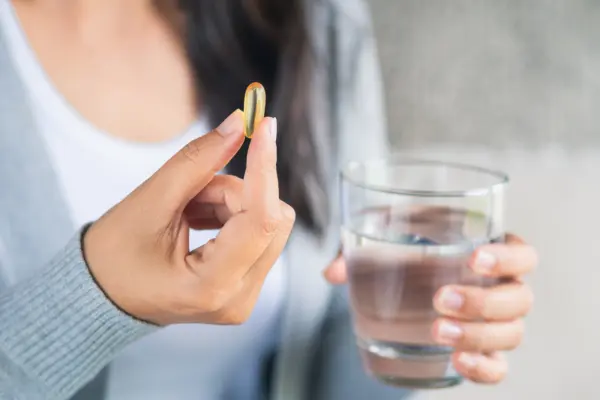Dietary Supplements
You have probably heard by now that the standard American diet is high in saturated fat, sodium, and sugar, and lacking in the necessary vitamins and minerals to keep us healthy. Many Americans are turning to the supplement industry for help. A dietary supplement, by definition, is any nutritional product that is taken in addition to your regular diet. Although most people recognize supplements as vitamins and minerals in pill form, they can also be botanicals, protein powders, herbals, or even fiber, as well as your average daily multivitamin. If so many Americans are not getting the nutrients they need from food, this begs the question: Should I be taking a supplement? If so, which one do I choose? Let’s start at the beginning and analyze this question further.

What exactly are vitamins and minerals?
Vitamins and minerals, also known as micronutrients, are substances your body needs in relatively small quantities for maximum health and to operate at its best. When considering necessary vitamins, just remember your alphabet:
Vitamins
- A: Vitamin A is most commonly known for its importance to eyesight, especially age-related vision problems like macular degeneration, which is a loss of central vision. Vitamin A is found in bright-colored vegetables, specifically sweet potatoes, carrots, tomatoes, and dark green leafy vegetables.
- B: The eight different B vitamins can help with metabolism and energy, along with some more specific functions like preventing birth defects and building proteins. They can be found in whole grains, green leafy vegetables, animal proteins, and beans.
- C: Vitamin C’s primary function is to support a healthy immune system. Besides citrus fruits and berries, it can also be found in vegetables like bell peppers, tomatoes, and broccoli.
- D: Vitamin D is a critical component for bone health by helping our bodies absorb and use calcium and phosphorus. Even though we can get vitamin D through food sources like fatty fish and cheese, our bodies can also make this vitamin by being out in the sun. Don’t forget your sunscreen!
- E: This vitamin works as an antioxidant to help protect your body from the type of cell damage that can lead to things like cancer or heart disease. Vitamin E is found in whole grains, nuts, and vegetable oils.
Minerals
- Calcium: Calcium is important for building strong bones as well as maintaining proper function of the heart and muscles. This mineral can be found in dairy products as well as fortified cereals and juices.
- Iron: Iron carries the oxygen needed in the bloodstream to give our bodies energy to function. Iron can be found in animal proteins as well as grains and beans.
- Potassium: Potassium is necessary for balancing fluid and mineral levels in the body and regulating blood pressure. Good sources of potassium are skin-on baked potatoes, cooked spinach, lentils, and raisins.
So, which is better: food or supplements?
When it comes to nutrition, getting our nutrients from whole food sources is ideal. Along with the necessary vitamins and minerals, food also provides other components to health that supplements do not. Antioxidants and phytonutrients are found naturally in foods and contribute to health by neutralizing cell damage that can be caused by poor diet or pollution. Whole foods, especially whole grains, fruits, and vegetables, also contain fiber, which is important to digestive health and can help you feel full without overeating—and it tastes better than most fiber supplements! Not to mention, getting our nutrition from a healthy, balanced diet also saves money, as supplements can be expensive.
But wouldn’t it be easier to just take a pill?
Although supplements have their place in the healthcare arena, they are not without their potential drawbacks. First of all, many Americans treat supplements like an insurance policy in case their regular diet is deficient. However, since many foods are already fortified with nutrients during processing, this could lead to taking potentially harmful levels of some vitamins and minerals without realizing it. Secondly, government agencies regard supplements more as a food substance than a medication, and therefore, they are not regulated by the Food and Drug Administration the same way that medications are. In fact, it is not required for a supplement to be approved by the FDA prior to marketing it to the public. Even though it is illegal for supplement manufacturers to make health claims about their products, with so many supplements being introduced to the market, this is difficult to monitor. It is possible to take too much of some vitamins, such as vitamin D, so it is important to be aware of what is contained in any supplement you are considering taking. Better yet, consult with a medical professional, especially if you are currently on any medications or have a chronic health condition.
Who should be taking a supplement?
Even though food sources are generally best, there are times when a supplement may be necessary. Certain populations, such as infants and children or the elderly, may benefit from taking a supplement to counteract a compromised immune system or a limited diet. Many athletes use supplements to boost their athletic performance. Some patients with digestive conditions like Crohn’s or celiac disease may need to take supplements to fill in the gaps when their illnesses prevent them from absorbing nutrients from their food. Pregnant or breastfeeding women may be prescribed a supplement by their healthcare provider to boost nutrition or prevent birth defects. If you feel that you have a nutritional need that is not being met through diet alone, it is best to discuss this with a registered dietitian nutritionist or your healthcare provider to ensure you are meeting your nutrition needs.
There is plenty of room for supplements in a healthy lifestyle. The important thing is to honestly assess your diet to see what may be lacking and find a way to meet that need. In most cases, a simple adjustment to your diet should be enough. If not, a supplement may be in order.
If you are concerned about any deficiencies in your diet, you can talk to a Health Loft dietitian in Chicago, IL (virtually via our telehealth platform or in person) by calling us at (312) 374-5399 or by scheduling an appointment online. Remember to also check out our Facebook, Instagram, and Twitter pages for more fun facts and articles on nutrition, physical therapy, and exercise!
Written By Rebecca Byerly
Edited by Alexander Franz
Reviewed by Morgan Murdock, RD.

References
- Dwyer, J. T. and Coates, P. M. (2018). Why Americans need information on dietary supplements. The Journal of Nutrition, 148(2), pp. 1401S-1405S. doi: 10.1093/jn/nxy081. Retrieved from https://academic-oup-com.er.lib.k-state.edu/jn/article/148/suppl_2/1401S/5064356
- Harvard Medical School. (2018). Do you need a daily supplement? Harvard Health Publishing. Retrieved from https://www.health.harvard.edu/staying-healthy/do-you-need-a-daily-supplement
- Klemm, S. (2019). What are B vitamins? Academy of Nutrition and Dietetics. Retrieved from https://www.eatright.org/food/vitamins-and-supplements/types-of-vitamins-and-nutrients/what-are-b-vitamins-and-folate













